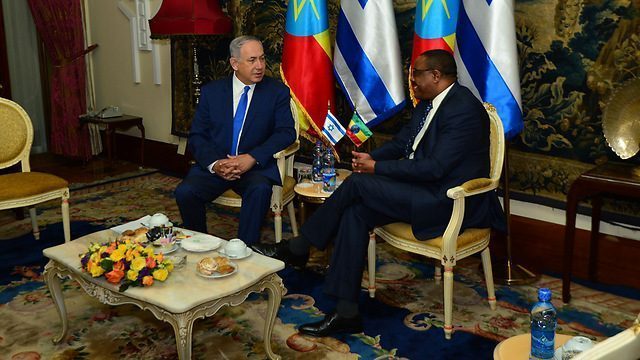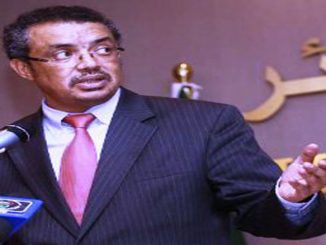
Netanyahu arrived late on Wednesday to pay a two-day visit to Ethiopia accompanied by an entourage of high-profile officials and 70 businesspeople, according to Anadolu Agency.
The two prime ministers held a private meeting followed by another meeting with their delegations. The delegations discussed ways to increase bilateral cooperation on a long series of issues including water, agriculture, communications, tourism and education. The two sides signed agreements to increase ties in technology, agriculture and additional fields.
Addressing the Ethiopian Parliament, Netanyahu, who over the week visited Uganda, Kenya, and Rwanda, said Israel is keen to support Ethiopia’s development, adding, “We believe Ethiopia is on the rise.”
Netanyahu said on Thursday that he had asked Ethiopian Prime Minister Hailemariam Desalegn for his help with securing the release of Avra Mangisto, an Israeli-Ethiopian who accidentally crossed the border into Gaza in September 2014 and is believed to have been captured by Hamas.
Ethiopia has a special place in the hearts of Israelis in the same way that Israel has a place in the heart of Ethiopians, Netanyahu told the MPs, pointing to the ancient relations between the two countries dating back to the biblical King Solomon and the Queen of Sheba.
Netanyahu called for enhanced cooperation between the two countries in the fight against terrorism.
After their meeting, Ethiopian President Teshome invited Prime Minister Netanyahu to observe the lion and lioness in the presidential palace garden.
Diplomatic relations between the two countries date back to 1955, then were broken in 1973 due to the Yom Kippur war, then were re-established in 1992.
In addition to trade ties, Ethiopia receives Israeli support in military technology and technical fields, according to official documents.
Ethiopia will support Israel’s bid to regain observer status in the African Union, said Prime Minister Hailemariam Desalegn on Thursday.
Addressing a joint press conference alongside visiting Israeli Prime Minister Benjamin Netanyahu, Desalegn said Netanyahu “has requested Ethiopia to support them in [regaining its] observer position in the African Union and as a matter of principle we see … no reason to deny [that].”
He said Israel was working very hard with many African countries in peace and security, development, and capacity development, among other areas.
Hailemariam also said Israel supports Ethiopia’s bid to become a non-permanent member of the United Nation Security Council beginning in 2017 and is supporting the country’s bid for World Health Organization directorship.
The African Union stripped Israel of observer status with the AU in 2003 in solidarity with the Palestinian cause, and gave Palestine observer status in 2013.
During Netanyahu’s visit, the two sides signed cooperation deals in the fields of culture and tourism and capacity-building.
It is difficult for the union to invite the leader of a country they consider an occupier, Palestinian Ambassador to Ethiopia Nasrri Abujash told Anadolu Agency.
To avoid confronting the African Union at large, whose collective stand has always been to support Palestinian statehood and condemn Israel’s settlements, Netanyahu’s strategy seems to be approaching countries individually.
An uncertain but sizable number of Ethiopian Jews still hope to emigrate to Israel.
“Netanyahu’s visit gives us some hope of reuniting with our families in Israel,” Tesfahun Adela, head of the Ethiopian Jewish Unity Association, told Anadolu Agency, estimating the number of Jews left in Ethiopia at 9,700. “The government of Israel has difficulty verifying the number.”
In his speech, Netanyahu described the Ethiopian Jewish community as a bridge between Ethiopia and Israel.
Netanyahu also stressed that Ethiopian Jews remaining in Ethiopia will continue to have the right to move to Israel. “We have a commitment and we are keeping it on a humanitarian basis and on the basis of family reunifications. It will take place in the current budget,” Netanyahu said.
“I am proud of the Ethiopian Jews’ contributions to Israel,” he went on to say. “They constitute a living link with Ethiopia and Africa. It starts with our Ambassador who is here and also the fact that I brought MKs Neguise and Tamanu-Shata who represent this link.”
Desalegn invited Ethiopian Jews living in Israel to come to Ethiopia and invest in the country. His offer comes after hundreds of Ethiopian-Israeli Jews recently demonstrated against what they called Israeli police brutality and referring to general discrimination in Israeli society.
Netanyahu’s four-nation Africa visit is the first to sub-Saharan Africa by a sitting Israeli prime minister in nearly three decades. He has visited Uganda, Kenya and Rwanda while pursuing closer security and other ties with African nations, which cut or limited their relationships with Israel in the 1970s under pressure from Arab countries. African states were also opposed to Israel’s close ties to South Africa’s apartheid government.
It is also within Israel’s interest to persuade African states to support it at the United Nations, where the Palestinians have been recognized as a non-member observer state since 2012.
About assassination attempt on PM’s life. Following a report in media that Netanyahu’s motorcade had to change its route during his visit to Kenya because of an explosives threat, the prime minister denied during his press conference in Addis Ababa that there had been an attempt on his life.
He said he was learning about the reports of an assassination attempt for the first time. “The answer is we know nothing about it because there is nothing in it,” said Netanyahu.
Kenyan officials similarly denied there was an effort to kill Netanyahu. “An attempted assassination can’t be secret. It has to be something visible, and to my knowledge there was absolutely nothing of the sort,” said Kenya’s Interior Ministry spokesman Mwenda Njoka.
Inspector General of Police Joseph Boinnet added to Njoka’s statement by saying, “I’m not aware, and there was no such thing at all. Those are lies.”
The Israeli prime minister is protected by heavy security in Israel and abroad, given high threats against Israeli targets around the world. Such threats are taken especially seriously due to the assassination of then-Israeli prime minister Yitzhak Rabin by a Jewish extremist in 1995.



